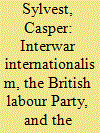| Srl | Item |
| 1 |
ID:
052405


|
|
|
|
|
| Publication |
June 2004.
|
| Summary/Abstract |
This article questions two interrelated myths pertaining to the interwar internationalism of the British Labour Party and the theories of so-called idealists in the academic discipline of International Relations (IR). In IR, interwar "idealists" are (in)famous for a detached and utopian approach to international politics. Conventional historiographical verdicts on the international policy of the Labour Party in the interwar period suggest that the party was the practical mirror of this naïve international outlook. In fact, the two themes are connected, most notably through Labour's Advisory Committee on International Questions. This article brings the study of Labour's internationalism and the international theories of purported idealists together by focusing on debates on the League of Nations and the use of force. The analysis reveals that conventional historiographical narratives are inadequate and too simplistic for grasping the diversity of Labour's internationalism and interwar progressivist ideas about international politics in general.
|
|
|
|
|
|
|
|
|
|
|
|
|
|
|
|
| 2 |
ID:
108885


|
|
|
|
|
| Publication |
2011.
|
| Summary/Abstract |
During the Vietnam War there were high expectations from the Johnson and Nixon Administrations for Japan and Britain to provide practical and political support for American military and strategic objectives in Indochina. The leader of Japan's conservative Liberal Democratic Party, Sato Eisaku, and the British Labour Party's Harold Wilson, balanced political support for the United States with significant public pressure at home to eschew any entanglement in the highly unpopular conflict. As junior allies of the United States both Sato and Wilson did not want to see the United States fail in Vietnam or the communist sphere expand in Southeast Asia. Both leaders accrued significant foreign policy advantages as a result of politically and publicly supporting American actions in Vietnam. But to placate domestic electorates that clearly felt uncomfortable over their governments providing explicit, albeit non-military, support to the United States in Vietnam, Sato and Wilson expended substantial prime ministerial diplomacy in attempting to play a mediatory role in the conflict. Each was highly successful in balancing domestic and American demands, whilst maintaining their security partnerships with the United States.
|
|
|
|
|
|
|
|
|
|
|
|
|
|
|
|